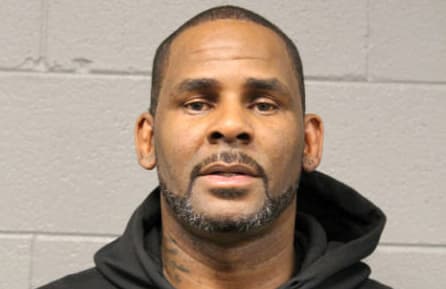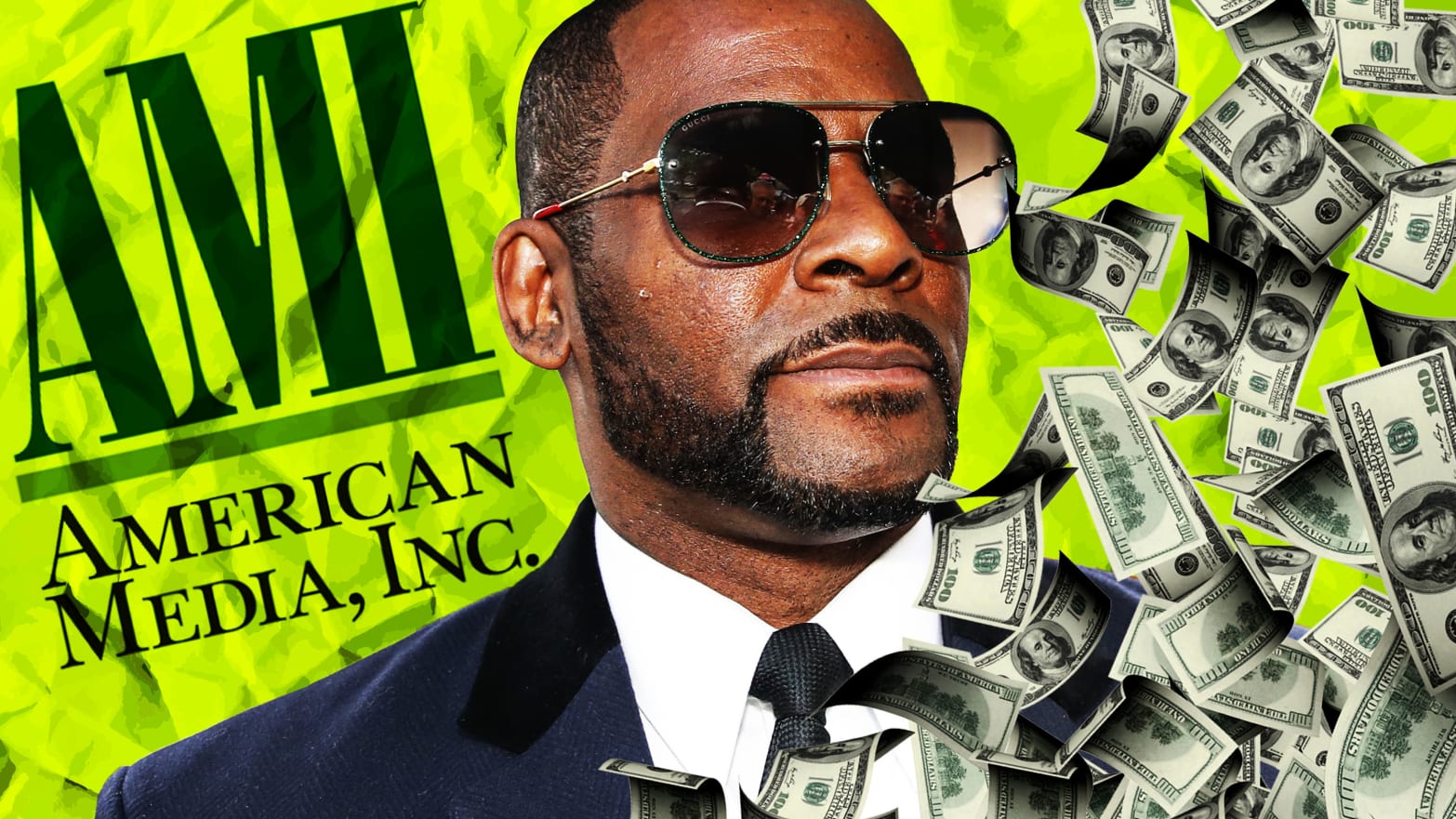A top executive in the National Enquirer tabloid empire proposed an elaborate scheme to secretly funnel more than $1 million to accused rapist and pedophile R. Kelly, according to documents and an audio recording.
The payment to Kelly would have rewarded the jailed R&B singer’s cooperation with a televised documentary series that Dylan Howard was hoping to produce for the Enquirer’s parent company, American Media Inc., and sell to a network.
The 37-year-old Howard, who used to be editor of the Enquirer and is now a senior vice president at AMI, negotiated over several months with Kelly’s representative, Don Russell, according to material reviewed by The Daily Beast.
During one of their conversations, which was tape-recorded, Howard suggested forming a shell company and using secret licensing agreements to hide payoffs to Kelly. He said AMI would then market the docuseries as “independent” of Kelly, an object of national revulsion who is accused of sexually abusing girls as young as 13.
“No network is going to buy or pay Mr. Kelly. They simply won’t do that. They are not going to take the public relations hit associated with doing business with him,” Howard can be heard explaining to Russell in the recording of the phone call, which was authenticated by The Daily Beast.
“Obviously, we would be embedded with you so it’s not as if it really is independent, but it has to be sold to the market as independent.”
“How do you profit?” Howard continued.
“I license music from you. I license locations from you such as homes, et cetera. And that is how you get profit participation in such a production, because no network is even going to allow a production company’s books to show, on their books, that there is a money trail going to you.”
“So it would have to be a production company through a shell company through to whatever company is designated on your end for the licensing of locations, licensing of music, and other things we can creatively come up with.”

Dylan Howard of American Media Inc.
Ilya S. Savenok/Getty
On the call, Russell relayed Kelly’s interest in striking a deal, citing mushrooming legal costs for the “I Believe I Can Fly” singer—who at the time was jailed on state sex-crime charges and about to be indicted by federal authorities.
“We are dealing with an important and embattled artist who everyone counts on his ability to generate revenue,” Russell said.
“So I gotta make sure that if we are doing this, that then is considered by all parties that we have to make sure he can pay legal fees, bills, and all that kinda stuff,” Russell added. “Because that puts him back into position for the next steps down the road, which is the movie of R. Kelly once he reigns supreme with this.”
Russell then told Howard: “I’m sure you guys will wanna have the first crack at that.”
In a written statement to The Daily Beast, Howard said the discussions stemmed from a pitch by Kelly’s camp and “went no further than general exploratory discussions between them and myself, and was never advanced internally at American Media.”
“During these conversations with them, I outlined myriad challenges, including the scope and seriousness of the allegations against Mr. Kelly, the necessity that the production be an objective portrayal, and the conceptual difficulties in the ‘fly-on-the-wall approach’ to Kelly’s legal defense,” Howard said.
“No final decisions were made between them and I on how a deal would be structured. Had a deal been pursued, I obviously would have made sure that any music used was licensed or sought location releases. The suggestion that, had a deal been pursued, I would have misrepresented the transaction to potential outlets is both pure speculation and false.”
Kelly’s Chicago-based criminal defense attorney, Steven Greenberg, said he visited the singer in jail on Monday and asked him for comment.
Greenberg told The Daily Beast: “This is literally what he said: ‘I have no fucking idea what you’re talking about. I don’t have any fucking idea. I don’t know anything about it. People are always trying to do stuff—make money, cut a deal, and tell me they got this opportunity.’”
The lawyer added, “There are always people trying to capitalize on the fact that they know R. Kelly.”
Russell, a longtime associate of Kelly who described himself as his manager in the spring, denied the conversations had happened.
“Me and Dylan have never spoken in that capacity in regards to a docuseries or anything with R. Kelly,” he said in a phone call on Monday.
“I don’t know Dylan in that capacity. I didn’t come in to negotiate deals,” Russell added, claiming he was just trying to promote Kelly’s side of the story to the media.
“I don’t know Dylan in any capacity of negotiating anything with him outside of shining a light on the fact that there are a lot of untruths in what they were about to be printing… and they backed down and didn’t run with it.”
Before hanging up, Russell made a threat. “I’m gonna tell you something. Publish the story. If I receive any negative backlash in business, I’m coming after you personally. Now you take that however you choose, my brother. Have a nice one.”
The authenticity of the audio recording was confirmed by Robert Maher, a professor of computer engineering at Montana State University-Bozeman, who performed a spectrographic analysis to produce a spectrogram—a graph that can be used to compare fundamental frequency, pronunciation, cadence, and range of pitch between two samples.
“There is no way to prove with 100 percent confidence that talkers in two different recordings are the same individual, but the audio comparison points to the likelihood that this is the case,” Maher said.
In addition to the calls, there was a flurry of email activity during the months of negotiations between Howard and Russell that show Howard was insistent that AMI could not directly pay Kelly, according to documents reviewed by The Daily Beast.
On the recorded call, Howard stressed to Russell that Kelly is “a lightning rod,” and thus, in order to get a TV outlet to bite, they would need to hide any paper trail.
“No one is going to touch him. The only people that are going to touch him are independent media companies that will take the risk because they know that it’s a good story and on the flip side the story will be monetizable,” Howard explained.
“So you are not going to get A&E, Lifetime, TLC, CBS, anyone throwing a cent at you. That’s why we’ve gotta structure it the way I’m saying we gotta structure it, ” Howard insisted.
“Let’s not exchange emails about this,” Howard also advised Russell. “Let’s just jump on another call and go over the finite points that you come up with and we can continue discussions.”
Howard was in touch with an executive at A&E and reported that they were enthused about the possibility of an R. Kelly series, according to a person familiar with the matter.
If AMI had cut a deal with a network that did not know about the secret-payment arrangement, that could have been legally perilous for Howard and his boss, chief executive David Pecker.
Former federal prosecutor and chief assistant New York district attorney Daniel R. Alonso, now a corporate lawyer, told The Daily Beast that while creating a shell company to hide a monetary transaction isn’t necessarily illegal, concealing such details from a party to the transaction—in this case, a television outlet—could constitute fraud depending on the circumstances.
“If they were hiding the true destination of the proceeds of the deal in order to deceive a counterparty into entering into the deal or parting with the proceeds,” Alonso said, “that starts to look a lot more like fraud.”
And a fraud allegation would have had far-reaching consequences.
In September 2018, Howard and Pecker entered into a non-prosecution deal with federal prosecutors in the Southern District of New York in exchange for helping provide evidence against President Donald Trump and his former attorney, Michael Cohen, concerning felony campaign-finance violations that involved Trump’s $130,000 payment to porn star Stormy Daniels mere days before the 2016 election. The payment stopped Daniels from discussing her allegation of extramarital sex with the candidate a decade earlier.
Cohen, who named Trump as a key participant in the felony, ultimately pleaded guilty to campaign finance violations, tax fraud, and bank fraud, as well as lying to Congress, and is serving a three-year sentence at the Otisville, New York, federal penitentiary.
Howard and Pecker’s non-prosecution agreement, meanwhile, gave the pair immunity from prosecution over their involvement in a “catch and kill” arrangement with former Playboy playmate Karen McDougal, who also claimed she had an affair with Trump and who—just three months before the 2016 election—was paid $150,000 by AMI for her “limited life rights.”
That payment, a potential violation of federal statutes, effectively silenced McDougal, keeping her allegation from becoming public and damaging Trump’s candidacy.
The non-prosecution pact stated that AMI “shall commit no crimes whatsoever” and that the tabloid magazine group—which also publishes Us Weekly, In Touch, and Star magazine—must maintain its obligations to SDNY prosecutors “for a period of three years from the signing of this Agreement or the date on which all prosecutions arising out of all the conduct described in the opening paragraph of this agreement are final.”
Alonso explained that the agreement could be invalidated “if the facts reveal that there was a criminal fraudulent scheme relating to shell companies, or if the company were to lie if asked about these details.”
“It would then be up to the SDNY to take action on the violation, which could include terminating the agreement and prosecuting the company, or something less,” Alonso continued.
On the recording of the phone call between Howard and Russell, R. Kelly’s manager emphasized that his client was keen for a payday.
“We all know if you got a lottery ticket you don’t wait to cash it in. That came directly from his [Kelly’s] mouth. You don’t wait to cash it in, you go right in for it,” the manager said.
Russell concluded by telling Howard he would relay Howard’s plan to the R&B star: “I spoke to Rob yesterday and he said, ‘Listen, if they throw me a bone…’—and that’s exactly what he said—‘…I’m with ’em.’”
At one point in his career, Kelly was the most popular R&B artist on the planet. Accusations against him first surfaced in early 2002, when the Chicago Sun-Times revealed the existence of a video that purported to show him having sex with and urinating on an underage girl. He was indicted on child-porn charges but acquitted by a jury.
He continued to produce albums and perform concerts even as his finances frayed. In 2013, Kelly’s custom-built suburban Chicago mansion, once valued at more than $5 million, sold for $950,000 in a foreclosure auction. Kelly was evicted in February 2018 from two Atlanta-area homes over more than $31,000 owed in unpaid back rent.

R. Kelly in a booking photo after his arrest in February.
Cook County Sheriff
In 2019, after a parade of accusers came forward to tell their stories in the six-part Lifetime docuseries Surviving R. Kelly, his record label, Sony Music, dropped him. A person with knowledge of Kelly’s music rights told The Daily Beast that “he doesn’t own the rights nor does anyone close to him own them.”
Kelly was soon facing a new round of criminal charges that could land him in prison for the rest of his life.
The disgraced 52-year-old singer is currently in a Chicago lockup awaiting trial on four separate federal and state prosecutions in Illinois, New York, and Minnesota.
He has denied the allegations. During an explosive interview between his incarcerations with CBS This Morning anchor Gayle King in March, the singer did himself no favors, claiming that decades of allegations of pedophilia and physical abuse of women, including the video, were simply lies. At one point he jumped out of his chair to loom threateningly over King as he screamed and ranted.
Howard, meanwhile, has been at the center of controversies that have nothing to do with R. Kelly.
In recent weeks, he hired law firms on three continents in an attempt to quash sales of Ronan Farrow’s book Catch and Kill, which details his alleged efforts to gather opposition research on actress Rose McGowan on behalf of her accused rapist, indicted movie mogul Harvey Weinstein, along with efforts by Pecker to purchase and suppress damaging stories about Trump.
Questions about whether Howard’s non-prosecution agreement had been breached were raised in February when Amazon billionaire Jeff Bezos published a sensational essay on Medium accusing AMI and Howard of a blackmail and extortion plot after the Enquirer published details of Bezos’ extramarital affair with Lauren Sanchez.
Following the fallout from the Bezos allegations, Howard was removed from the Enquirer and given a new corporate development role overseeing TV deals and podcasts for the embattled media company. It was also announced in April that AMI was selling The National Enquirer and sister titles Globe and National Examiner to Hudson News boss James Cohen for $100 million.
The move was orchestrated by the hedge fund that owns AMI, Chatham Asset Management, which drew heat from investors who did not want to be associated with what they considered a sleazy tabloid. People familiar with the situation told The Daily Beast that the deal has yet to close, some seven months after being announced.



